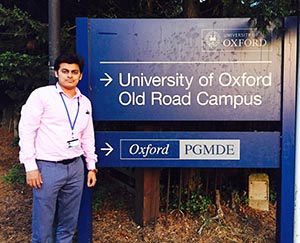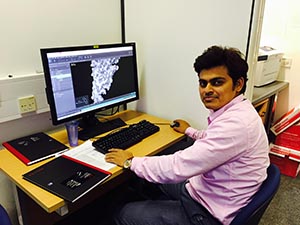UM PhD student joins drug design project against Ebola at Oxford
澳大生到牛津大學研發治療伊波拉藥物
19 Sep 2016
 UM PhD student Faraz Shaikh conducts research at the Wellcome Trust Centre for Human Genetic at the University of Oxford
UM PhD student Faraz Shaikh conducts research at the Wellcome Trust Centre for Human Genetic at the University of Oxford澳大博士生Shaikh在牛津大學人類基因學威爾康信託中心做研究
 Shaikh participates in a drug design project against the Ebola virus
Shaikh participates in a drug design project against the Ebola virusShaikh參與開發針對伊波拉病毒藥物
Mr Faraz Mohammadali Shaikh, a doctoral student from the University of Macau (UM) Faculty of Science and Technology (FST), has received an internship offer from the Wellcome Trust Centre for Human Genetics at the University of Oxford, United Kingdom. Shaikh will participate in a drug design project against the Ebola virus.
Ebola is a highly virulent pathogen which can cause a severe hemorrhagic fever with a high death rate. Shaikh will work on the computational methods for designing drugs against Ebola. He will use computer simulations and fragment-based molecular docking to explore viral activity – in particular how the virus enters the host cell – at the atomic level, and investigate ways to effectively inhibit virus attachment and membrane fusion. The goal of this research project is to identify chemical entities as potential candidates for developing drugs against Ebola.
This project is headed by Prof David Stuart, director of Oxford’s Division of Structural Biology. The world-class research group at the division has been focused on solving the complex problem of structure-function relationship of viruses of different sizes, and the puzzles of virus-receptor interactions and virus assembly, with innovative experimental and computational techniques.
Shaikh has been working on protein flexibility algorithms and drug design applications in the Computational Biology and Bioinformatics Lab, headed by Dr Shirley Siu Weng In, since September 2015. He has worked as a senior research fellow at the Centre of Excellence at the National Facility for Drug Discovery Complex, Rajkot, India. He received the DBT Senior Research Fellowship from the Indian government from 2013 to 2015. So far he has published more than ten papers in international journals.
澳門大學科技學院博士生Faraz Mohammadali Shaikh獲英國牛津大學人類基因學威爾康信託中心WTCHG錄取實習,參與針對伊波拉病毒的藥物設計項目,肯定了澳大的科研教學。
Shaikh研究針對伊波拉病毒的計算藥物的設計方法,伊波拉病毒是高致病性病原體,可引致死率高的嚴重出血熱症。在此研究項目上,Shaikh將通過利用計算機模擬和基於片段的分子對接,探討在原子細節層次上的病毒性活動,尤其是病毒是如何進入宿主細胞,以及調查病毒附著和細胞膜融合的有效抑制方法。是次研究目的透過識別潛在的化學複合物,開發針對伊波拉病毒的藥物。
此牛津項目由結構生物學分部主任David Stuart教授負責。該世界級研究小組一直專注於研究不同大小的病毒結構與其功能關係的複雜問題,通過創新實驗和計算技術去解決病毒受體的相互作用和病毒組裝的難題。
Shaikh於2015年加入由澳大助理教授蕭詠然所帶領的生物信息學實驗室,主要研究蛋白質的靈活性算法和藥物設計應用。Shaikh曾擔任印度拉傑果德國家藥物發現卓越中心的高級研究員,於2013年至2015年被印度政府授予DBT高級研究獎學金,發表在國際期刊的論文多達10餘篇。他穩固的研究基礎加上澳大的高級培訓使其受益匪淺,並獲得了參與拯救生命的牛津大學藥物研究機會。
